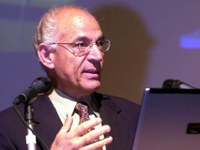 "Long-range policies," El-Baz notes, "could transform the oil-rich Arab countries in the region – Kuwait, Bahrain, Qatar, Saudi Arabia, the United Arab Emirates and Oman – "into a global centre of renewable energy." El-Baz, who is director of the Center for Remote Sensing at Boston University, USA, and adjunct professor at Ains Shams University, Cairo, Egypt, makes his remarks in the most recent edition of the TWAS Newsletter.
"Long-range policies," El-Baz notes, "could transform the oil-rich Arab countries in the region – Kuwait, Bahrain, Qatar, Saudi Arabia, the United Arab Emirates and Oman – "into a global centre of renewable energy." El-Baz, who is director of the Center for Remote Sensing at Boston University, USA, and adjunct professor at Ains Shams University, Cairo, Egypt, makes his remarks in the most recent edition of the TWAS Newsletter.
The UN's selection of the United Arab Emirates (UAE) to host the International Renewable Energy Agency (IRENA), says El-Baz, "represents a first step in a broader strategy to tap the Gulf's wealth of renewable energy sources.
To date, 143 countries and the European Union (EU) have signed IRENA's statutes. The organization's interim headquarters are located in the UAE capital city of Abu Dhabi and the UAE has agreed to provide USD22 million in annual support through 2015. In addition, the Abu Dhabi Fund for Development has offered IRENA USD50 million in annual loans to finance renewable energy projects in developing countries. This will amount to a "financial commitment of USD250 million over the next five years," El-Baz observes.
IRENA's permanent home will be located in Masdar, Abu Dhabi's 'clean energy cluster' now under development on the outskirts of the capital city.
The goal, El-Baz says, is to create a "green city in the desert sands" with the energy cluster serving as a source of cutting research and development of the most advanced renewable energy technologies. The city itself plans to rely on new technologies to provide all of its services. To aid in this effort, it established the Masdar Institute of Science and Technology (MIST) in 2009. MIST, says El-Baz, is dedicated not only to research but also to "graduate training in alternative energy, environmental technologies and sustainability."
"Are we witnessing the beginning of a new phase of science-based development in the region?" asks El-Baz. "And could this be a sign of a larger shift in the balance of science and power from the West to the East?"
What has taken place so far, El-Baz admits, represents small steps. But he adds that these steps could be part of a fundamental transformation of global science.
To read the entire article, download the PDF (207 Kb).

